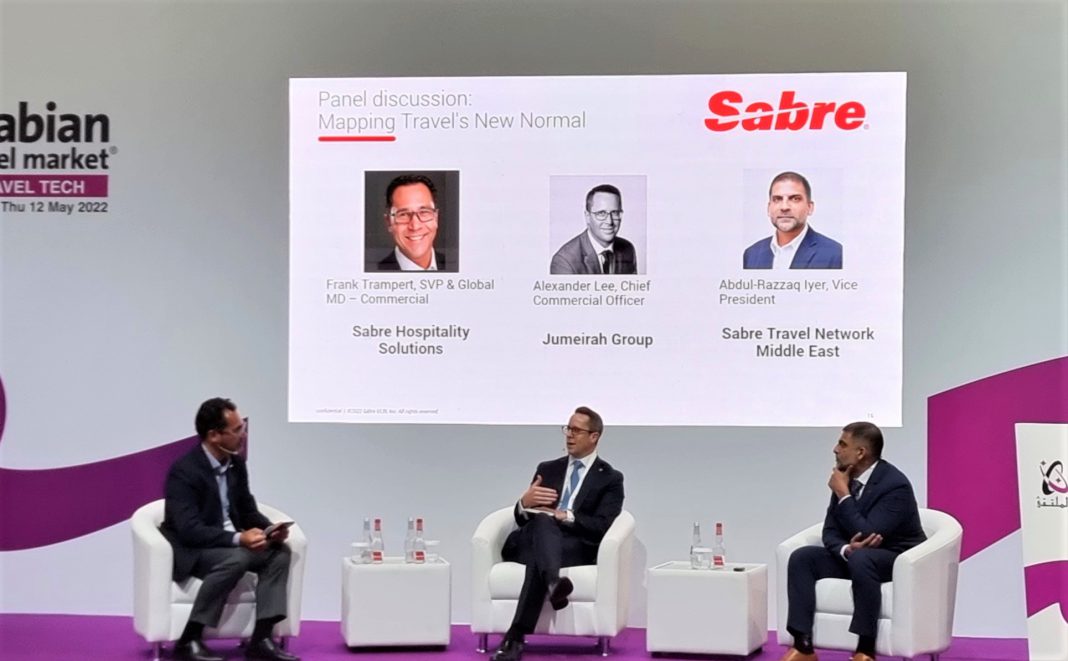Sabre Corporation, a leading software and technology provider that powers the global travel industry, conducted a panel discussion at Arabian Travel Market (ATM) in Dubai to discuss a new global travel industry study, ‘Mapping Travel’s New Normal’, which identifies prominent shifts in travel.
The rise of connected trips, blurred lines between leisure and business travel, and an accelerated pace of change – survey results are conclusive of travel has changed post-Covid.
A wide-ranging study highlighted the different areas of focus for airlines and agencies as both sectors seek to capture opportunities for recovery and for future growth. Commissioned by Sabre and carried out by Munich-based management consultancy Dr. Fried & Partners, the study involved both quantitative and qualitative research with 500+ decision-makers from airlines and travel agencies. Respondents were surveyed in eight languages across 20 countries in EMEA, APAC and the Americas, along with in-depth interviews with selected industry leaders.
Participants were questioned about the impact of the pandemic on their customers and their businesses, as well as the implications for the future of the travel industry. Key findings cover the differing priorities of airlines and agencies as both sectors prepare to address potential recovery opportunities and create new opportunities for growth, as well as differences in technological investment priorities by global regions. Findings include:
– More than a third of airline and agency leaders participating in the survey indicated that they believe travel will return to pre-pandemic levels by the end of 2024; a further third responded that they believe this will happen in 2025 or beyond;
Survey results indicate that “revenge travel” – with the objective of making up for lost time – is a meaningful phenomenon, with 68 per cent of travel leaders responding that they are forecasting a higher spend from consumers on their future travel plans;
Travel leaders report that travelers are considering more decision factors than ever before committing to a trip;
– 82 per cent of airlines executives surveyed responded that they expect the combination of business and leisure to be even more prominent post-recovery;
More than half of agencies surveyed responded that they are spending more time now looking into new tools, services and technologies; this is a particular area of focus in APAC, for 71 per cent of responding agencies;
– 92 per cent of travel agencies surveyed indicated that they want the support of travel technology partners to create a more seamless experience in terms of shopping, booking and fulfilment, while 89 per cent responded that they want useful tools to personalize travel;
– 96 per cent of airlines surveyed responded that they expect enhanced possibilities to offer growth opportunities and improved customer service and satisfaction scores
Key trends identified by surveyed agencies in the new Sabre-Dr.Fried research include the importance of organized and connected trips to cut through travel complexities for customers; the ongoing prominence of domestic and regional travel and the challenges (and opportunities) for business travel recovery.
Meanwhile, for airlines participating in the survey, major trends identified include increasing consumer bookings protection; the growth of “bleisure” as a catalyst for potential corporate travel recovery and offering more sustainable flight options to meet customer demands. Mirroring agency responses, the survey indicates that airlines are also focused on increasing domestic and regional routes as well as how new product formats such as organized and connected trips can help optimize recovery opportunities while creating increasingly personalized experiences for travelers.
“Our latest Sabre research has highlighted a degree of optimism across the travel ecosystem,” said Abdul-Razzaq Iyer, Vice President, Sabre Travel Network Middle East. “However, it also suggested that not all travel leaders may be ready for these potential changes if they happen quickly. The survey indicates that there is a clear need for agility, transformation and collaboration so that travel agencies, airlines and other industry players can ensure they are in a position to identify these changes, strategize for future growth opportunities and improve the experience for the traveler,”
“One thing that struck us as we were carrying out the research was the unprecedented pace of change in the past few months,” said Frank Trampert, Senior Vice President and Global Managing Director, Sabre Hospitality. “The overall improvement in the hospitality industry in all global geographic regions has been particularly positive, supported by a significant return of more profitable international and corporate travel. While domestic, leisure travel continues to lead recovery, corporate is narrowing the gap, and hoteliers are benefiting from this “bleisure” growing trend.”


